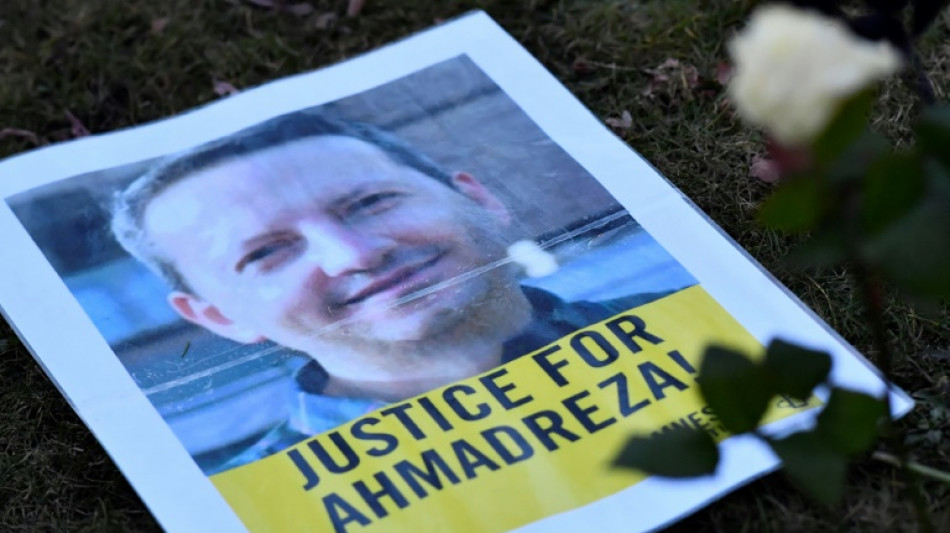

Activists condemn Iran 'hostage taking' of foreigners
Iran is engaged in a brazen policy of hostage taking of foreigners to extract concessions from the West, activists say, with further Western nationals arrested and others even facing execution.
Campaigners accuse Iran of a systematic policy of hostage taking over four decades from the earliest period of the Islamic republic after the ousting of the shah, starting with the 1979-1981 siege at the US embassy in Tehran.
France said Thursday that two of its citizens had been detained in Iran, with sources identifying them as a French teachers' union official and the unionist's spouse, and the foreign ministry denouncing a "baseless arrest".
Meanwhile, Swedish-Iranian academic Ahmadreza Djalali is at risk of an execution that media reports say is due to be carried out by May 21, over his 2017 conviction on spying charges that are vehemently denied by his family.
Iran denies any such policy of hostage taking and insists all foreigners are tried according to due legal process. However it has repeatedly shown a willingness for prisoner exchanges and taken part in swaps in the past.
"It is diplomacy by coercion: not settling international disputes simply by classic negotiation between states," said a Western specialist on the issue, asking not to be named due to the sensitivity.
- 'Call it hostage taking' -
Even after the recent high-profile release by Tehran of British detainees Nazanin Zaghari-Ratcliffe and Anoosheh Ashoori, activists say at least a dozen Westerners including Americans, British and Germans citizens remain held in Iran.
German citizen Jamshid Sharmahd is on trial in Tehran on charges that could see him hanged, as is Swedish national Habib Chaab. Supporters say both men were abducted in third countries before being brought to Iran.
These tensions are also growing at a hugely sensitive moment in the talks to revive the 2015 deal on curbing Iran's nuclear programme, with Europe warning that Tehran has a last chance to strike a deal.
Mahmood Amiry-Moghaddam, founder of the Iran Human Rights NGO, said there was "no doubt" the Westerners were being held as hostages, saying Europe needed to take a firmer line and condemn Iran's actions as hostage taking.
"Iran has carried out hostage taking for a long time, for the last 40 years. It has been successful as a policy, as Western countries have always responded. So Iran continued," he told AFP.
"It is a big problem for Europe that they are not calling the hostage taking for what it is. It is a huge mistake that puts human lives in danger," he said.
Wary of adding further complications into the already prickly nuclear talks, major European powers have generally steered clear of public accusations that Iran is carrying out hostage taking.
In a rare moment of candour, French Foreign Minister Jean-Yves Le Drian said in an interview in January that France was pressuring Iran "to ensure that these hostages –- and we have to call it this –- who are held in Iran are freed".
But contacts continue between Europe and Iran, with the EU's foreign policy number two Enrique Mora in Tehran this week for talks on salvaging the nuclear deal.
- 'Blatant extortion' -
Amiry-Moghaddam described the fate of Djalali as a "very important test" for Europe, saying "whether they can save him will be decisive."
Warnings by Iranian media and officials that he faces execution have coincided with the conclusion of an unprecedented trial in the Swedish capital Stockholm of former Iranian official Hamid Noury, who was arrested in 2019 over the 1988 massacres of thousands of opposition prisoners.
The trial, taking place under the principle of universal jurisdiction, has infuriated Tehran, which this month summoned the Swedish ambassador. Meanwhile, another Swedish man was arrested in Iran this month.
"The Iranian government is engaging in blatant extortion," said Hadi Ghaemi, executive director of the US-based Center for Human Rights in Iran (CHRI).
He accused Iran of "collecting dual nationals to use in its arsenal of human bargaining chips".
Raphael Chenuil Hazan, director of the France-based NGO Together Against the Death Penalty (ECPM), said Europe "cannot remain silent" in the face of the risk of executions of dual nationals.
"The death penalty should not be used as a political bargaining tool. Iran must understand that this execution would inevitably have a strong political cost," he said.
E.Mancini--IM




